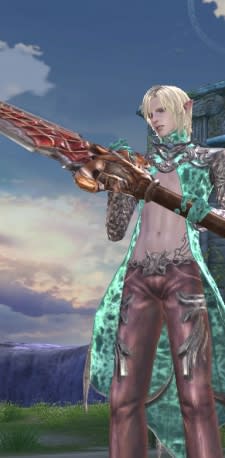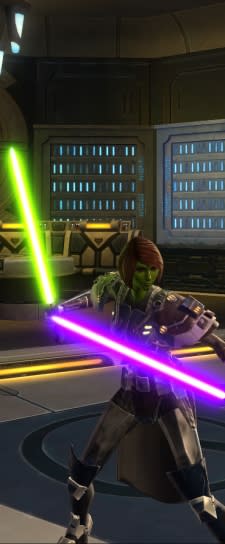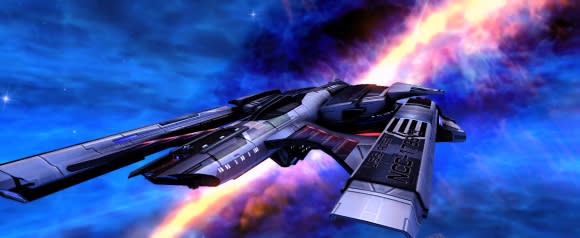The Soapbox: Better models for MMO endgame progression, part three
Today marks the last entry in my better models for MMO endgame progression series, the follow-up to my series on why MMO studios should abandon raiding. And that means providing two more possible models along with something of a thesis statement. But it also means that at this point I'm far more willing to wander off into the woods with these ideas. The first part had slight twists on standard formulas, the second had ideas that was a bit further afield, and this one features two ideas that are still almost entirely unrefined.
More specifically, today's concepts are more about tackling the very principle that progress has to be tied past a certain point to things that you get. You earn a thing and then you're better. But there's no reason that progress can't be oriented the other way, with the gear (etc.) just being a gating mechanism for your actual forward motion.
The funny part is that a lot of these systems aren't really at odds with one another; they can coexist without too much trouble. But then, that's the nature of the beast.

Affinity bargains
Let's step completely outside of game systems for a bit, shall we? If you look at fictional weapons or armor, you probably notice that games sort of have the setup backward. Oh, sure, you hear a lot about how items get forged with exceptional materials, but what makes them noteworthy is what they do. Heck, that's even true to life. Your brand-new car is nice, but it's only when you start taking it down some dirt roads and driving cross-state or whatever that it really develops some character. The good cars get better with time; the bad ones fall by the wayside.
So why not work with that? Why not have your arsenal be pegged entirely at a power level based on how much you've done with them, not where you got them?
Every item dropped or crafted has a hard limit of how strong it can be. There are cosmetic differences, sure, in colors and the like, but not in terms of raw power. When you find them, even in the highest bits of content, they can't pass a certain fairly low threshold.
What they do have is plenty of space for improvement. And you unlock those improvements through your deeds. At the top of the game, you are still fundamentally leveling, it's just that you're leveling your items rather than leveling your character. This wouldn't be a straight process of leveling; it'd require specific tasks in order to take your item to the next level instead of tossing points into a bucket and waiting until they pass a marker line (like legendary items in LotRO).
Of course, in a game like that, the content should by its very nature spend less time emphasizing what you're getting and more time emphasizing what you're actually doing at any given moment. Arena-style boss fights a la Final Fantasy XIV would fit in wonderfully, pitting a group of players against a difficult opponent to unlock an improvement as the end goal. Rather than full-on dungeons, scaling instances would work better, along the lines of the various Star Trek Online missions -- completing these deeds is a step along the path to improving your items.
You can also keep progression horizontal by allowing only a limited number of enhancements on a given item and making them choices to stick by. So for one sword, you want plenty of fire damage and Strength, but another sword has no elemental damage and a whole lot of magical abilities. Each one requires a different customization path; each one gives you plenty of reasons to venture out and hunt great beasts or undertake difficult tasks.
Best of all, this system can help solve one of the obvious problems raising the vertical limit: Allow it, but then also up the power limit of crafted or dropped items. So your sword can now become 10 levels more powerful, but a new player coming in can buy a sword that starts out 10 levels above the old baseline. Instead of making an ever-higher mountain to scale, you reset the starting point while still giving players something to work toward and accomplish.

A foundation of achievements
For my last suggestion, I want to get really out there. Let's throw out equipment altogether because we don't need it. Throw out levels, too. Everything here is a matter of clearing achievements.
Enemy strength relative to yours is measured in power. An enemy that can pose no threat to you whatsoever is at 0; one that provides a fairly reliable solo fight that isn't too bad would be at 1. Fights that have a relative power of 3 or 4 can still be handled solo, but grouping doesn't reduce the relative power.
Want to up your attack power? Kill, say, 100 power's worth of enemies. You could team up with a huge group of people and take on something that would roast any of you individually, picking up a big bonus when you all manage to kill it. You could go in solo, taking down enemies that just offer a slight increase. You could form a small group and take on slightly harder enemies for a net increase in gains. But all of them will lead you down the same road, in the end. It's not about farming for drops or anything else; it's about finally dropping enough of your enemies to get an attack bonus.
All of the boosts you can pick up over time work a bit like abilities in The Secret World insofar as you can have only so many of them running at any given time. The number you can have is generous, and you'd want to be sure that the UI is fairly reliable and straightforward as opposed to an endless chore. You just need some form of limiting mechanism to avoid making every character an endless magical and physical powerhouse of doom.
Content-wise, an ideal solution would be to have repeatable content along the lines of WildStar's Paths for given player abilities; clear a number of them to access boosts and abilities, for example, related to what you're doing. Quest lines can gate abilities and other special tricks, visual pieces, and so forth. The game could work just fine with a traditional solo/small-group/large-group content structure, so long as the achievements you need aren't gated solely behind one group size; the power requirements balance things.
One of the major issues that you run into with a vertical endgame is that the challenge gets easier for those who clear for it while the rewards stay the same. If your raid group is able to net a world first clear on something, you can go in next week with better gear and get the same rewards with less effort than the group still struggling. Cut to two months later, and the group that made it through immediately is miles ahead of the group just starting, and the group starting fresh feels as if it's a perpetual game of catch-up.
By scaling power based on the power of people accomplishing things, this system becomes unhinged. Yes, you want to clear through new content to unlock new achievements and thus new abilities, but you see bigger gains when you're first exploring compared to your umpteenth run. Place methods for everyone to earn that progress over time, and the people at the top have to do more work as they increasingly out-power the content they're running.

"But you forgot this!"
There are, I am sure, people who can come up with other endgame models. I haven't even touched on PvP-centered models. In fact, most all of these are very vertically arranged progression models.
But that's part of the point right there. They're vertical progression models that don't require raiding content to work. And they're just the first six that sprang to mind. I could easily make this into a weekly column, although it'd be largely pointless as I'm not actually developing a game.
The point is that calling a raid-centric endgame a necessity of anything progression-related is absurd. It's not a requirement. It's not something dictated by the nature of the game. It's a choice, and like any choice, there are alternatives available. What makes raiding into a necessity of endgame progress is simple developer laziness and tradition, not anything inherent to the genre.
There are lots of other possibilities that present themselves. These were half a dozen. There are so very many more.

Everyone has opinions, and The Soapbox is how we indulge ours. Join the Massively writers as we take turns atop our very own soapbox to deliver unfettered editorials a bit outside our normal purviews (and not necessarily shared across the staff). Think we're spot on -- or out of our minds? Let us know in the comments!


